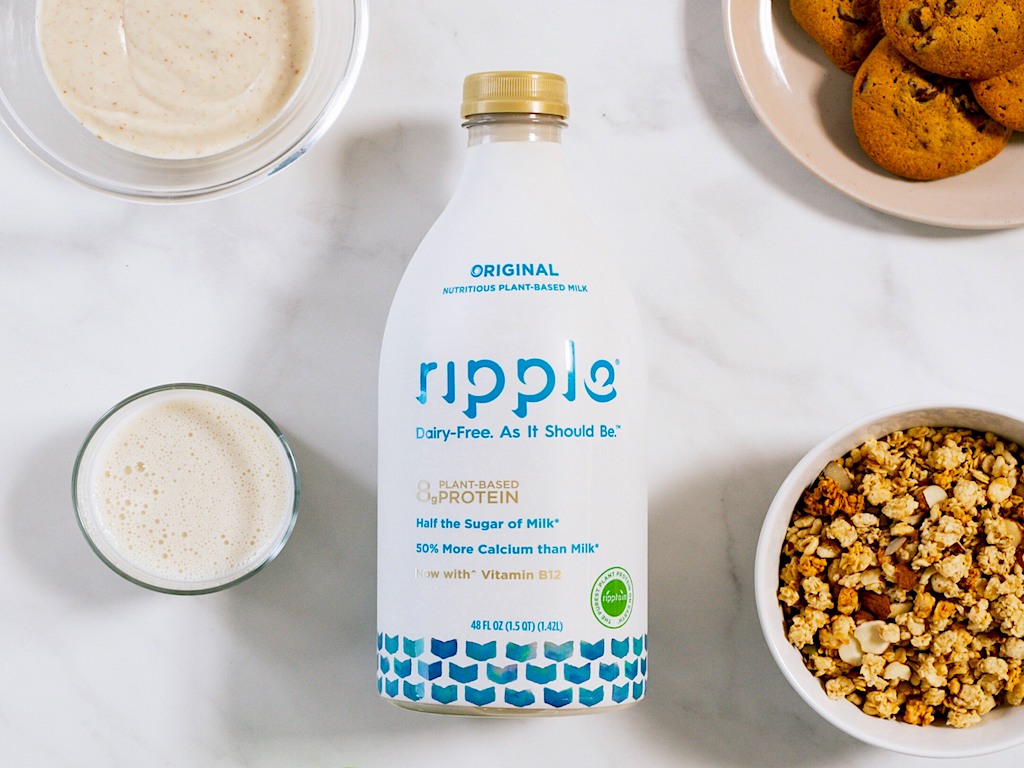3 Mins Read
Multizen, one of the largest B2B confectionery and snack companies in the Greater China region, has recently announced investment into Californian vegan pea-based dairy brand Ripple Foods. It marks Multizen’s first sustainable impact investment into startups providing disruptive food solutions and comes as the plant-based trend takes off in Asia.
Leading OEM confectionery and snack manufacturer Multizen Holdings, whose brand customers include Godiva, Hershey’s and MARS, has recently invested in Californian food tech Ripple Foods. Speaking to Green Queen exclusively, Multizen’s CEO Tommy Lee said that the investment is a part of the company’s understanding that consumers in Asia are increasingly demanding healthier and environmentally-friendly products.
“Chinese consumers are continually buying more and more quality products that are ‘good-for-you’ instead of focusing purely on price,” Lee said. “As the younger generation is more educated and more well-traveled, the next trend will certainly be from ‘good-for-you’ to ‘good-for-the-world’.”
Lee added that for his company, which currently has over 55,000 square-metres of manufacturing space in Hong Kong and in Nantong, a city in Jiangsu, China, keeping up with this trend is vital for the firm to continue to expand in Asia.
“For Multizen to grow in our B2B manufacturing industry, we also need to understand this trend and take part in it,” Lee told Green Queen. “Our goal is to be involved in these startups at an early stage, and eventually when they are ready to expand into Greater China, we can be their potential manufacturing partner in this part of the world by helping them to get products quickly to the local markets here.”
Founded in 2014 by Adam Lowry and Neil Renniger, Ripple Foods offers a range of vegan dairy alternatives made using its proprietary Ripptein – a protein blend extracted from peas while isolating the off-flavour typically associated with conventional pea-based proteins. Ripptein is used to create Ripple Foods’ suite of plant-based dairy substitutes, including pea milk, protein powder, protein shakes and yoghurt.
Not only does the startup’s pea milk boast 8 grams of protein per serve, it comes at a fraction of the environmental footprint compared to conventional dairy, which is responsible for 4% of all global human-caused emissions, making it almost twice as carbon-intensive as the aviation industry. Pea milk offers an even lower environmental impact compared to other plant-based nut milks, such as almond milk, which takes around 6 times more water to match the amount of protein in Ripple Foods’ milk.
Indeed, Multizen’s investment into Ripple Foods aligns with the fast-changing composition of the global dairy market. Earlier in January, Borden Dairy became the second major cow’s milk producer in the United States to file for bankruptcy, citing “market challenges” driven by the current dairy-free trend. New Zealand’s Fonterra, the biggest dairy exporter in the world, has reported its second consecutive year of losses. Meanwhile, the sales of plant-based milks such as oat milk has risen sharply by a whopping 636% between 2018 and 2019.
Read: Beef & dairy industries to collapse by 2030, says new report
But it isn’t just non-dairy taking off. Consumers across the world are also showing increasing interest in plant-based alternatives over the past few years, especially as concerns about sustainability and health reach top-of-mind awareness.
In a recent Ipsos survey commissioned by Hong Kong’s plant-based group Green Monday, a record 34% of Hong Kong consumers – 2.5 million people – now identify as flexitarian eaters. The poll also indicated that the ongoing coronavirus pandemic has pushed the plant-based trend even further, with over a quarter of young people saying that they will significantly reduce meat intake as a direct result of the outbreak, which has exposed our broken meat-centric food system.
“I do personally believe that sustainable foods, [such as] plant-based, will be a big trend in Asia,” Lee told Green Queen. “This trend is irreversible with or without Covid-19.”
Looking ahead, Lee shared that backing Ripple Foods is only the beginning for Multizen’s trajectory ahead. “Ripple Foods is our first investment, and we will be investing into other sustainable [and] impact food tech companies in the near future.”
Lead image courtesy of Ripple Foods.




